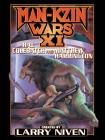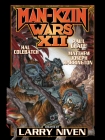Man-Kzin Wars XI by Hal Colbatch (ereader manga txt) 📗

- Author: Hal Colbatch
Book online «Man-Kzin Wars XI by Hal Colbatch (ereader manga txt) 📗». Author Hal Colbatch
"So Raargh-Hero drilled into me in our earliest hunts. And so wrote my Honored Sire Chuut-Riit."
"Pak, as far as we know, are enormously patient. After all, they are very long-lived. That is probably one reason why, though they had spaceflight for a long time, they never, as far as we know, bothered with any space-drives beyond fairly simple interstellar ramjets. Also, of course, after a certain level, perpetual war may militate against technological progress. The original Pak colonization project took tens of thousands of years just to get to these systems. They didn't mind. They don't have the weakness of impatience . . .
"Perhaps Morlock Protectors would not be as smart as either Pak or human Protectors. They are starting from a much lower pre-change base-level of intelligence than human Protectors, certainly. Living in a largely risk-free, challenge-free environment in the caves for tens of thousands of years they might have devolved. They might. But that they've devolved enough is not the way to bet.
"But they might get the hyperdrive."
* * *
"You're trusting him with a lot," Leonie said, as Vaemar's car dwindled in the northeastern sky.
"He'd have worked out the Morlock-Pak relationship for himself. In fact, I mentioned it to him a long time ago, when it didn't seem important in the way it does now. Don't forget, he'd also done work on the Hollow Moon as part of his space-engineering units." The Hollow Moon was one of Wunderland's many small moons, further away than most. About four miles across, with a space at its core, so deep radar said, apparently about a mile in diameter, it orbited Wunderland at a distance of about 60,000 miles. Apart from being hollow, its other oddities included a near-spherical shape, usually only associated with objects of far more mass and gravity. Humans had begun to study it before the kzin invasion, but that study had been dropped during the war and the Occupation. What human spacecraft the kzinti had permitted to fly then were needed to keep the shattered economy turning over, not for abstract research or flights into areas that the kzinti might disapprove of. There were what appeared to be ancient tunnels leading, presumably, to its core, but they were blocked. Its metal content was quite high, but that of many other moons and asteroids was higher and these were more worth mining. There were entrances to its tunnels of some depth, but during the war neither side had used these much as hiding-places, simply because they were too obvious.
After Liberation abstract and academic scientific projects had resumed slowly, the cheaper ones first. There was plenty to do on the surface of the planet and on the inhabited asteroids and little money for space exploration. Policy had been to leave the anomalous moon alone until there were again resources available for a proper, long-term expedition. It had been thought at one time that it was an ancient artifact of the Slaver Empire, but its orbit was receding gradually from Wunderland (one reason it had not been demolished as a danger by the first colonists), and if it had dated from the Slavers' time it would have disappeared into space long ago.
"I stick to my old idea. What could it be but the original spaceship the Pak used for the journey from Sol?" Rykermann said. "In any case if I can't trust Vaemar after what we've been through, who can I trust? Yes, laugh if you like."
"You know, don't you," Leonie said, "that seeing you and Vaemar together—like the fulfilment of everything I'd been working for—was important in helping me live. I think I'm entitled to laugh. Sometimes it seemed it was your hand I was holding, and sometimes a kzin's."
Rykermann nodded. No need to ask what she referred to. After she had partially come out of the tank, Vaemar and Raargh had spelled him, sitting at her side while he slept. The hospital staff hadn't liked it at first, but the kzinti had been very insistent, and he had cooperated with them.
"I wish . . . I wish Brennan had been right, and we could have kept the gentle society we had," said Leonie. "There is nothing good about becoming warlike."
"We had no choice," said Rykermann. "But you know I'm a convert now. I'll work for peace and reconciliation. Work with Vaemar and the Wunderkzin."
"I know. It's stupid of me, perhaps, but I feel I must say it. We have been at war for sixty-six Earth years. The war goes on in space. One gets weary. Gorillas settled their quarrels with gestures and rituals."
"But kzinti didn't. Or Pak . . ."
"I suppose so," said Leonie, shedding her clothes. "Let's go to bed." But her eyes were full of apprehension.
Rykermann still found it disturbing to look at his wife as she stood there naked. There were no scars marring her body, but when she was seen from a few feet away certain things became more apparent: below the waist that smooth skin was a little darker than it had been, the hair was a different color, and there was a difference in the vase of her hips and thighs. The pubis was more prominent, and the buttocks a little flatter above and fuller below.
Those were among the external differences. Her body was beautiful, as were the bodies of most men and women on a light-gravity world where modern medicine and cosmetic techniques were again available, but much of the lower half of that body had once been someone else. That and much more had left them both emotionally bruised and vulnerable. Leonie had lost consciousness as they were carrying her out of the cave, and had not known until a long time after the operation what had been done to her—Rykermann did not know if she would knowingly have accepted such a transplant even to save her life—and telling her had taken some time. Now they lived with it, and





Comments (0)